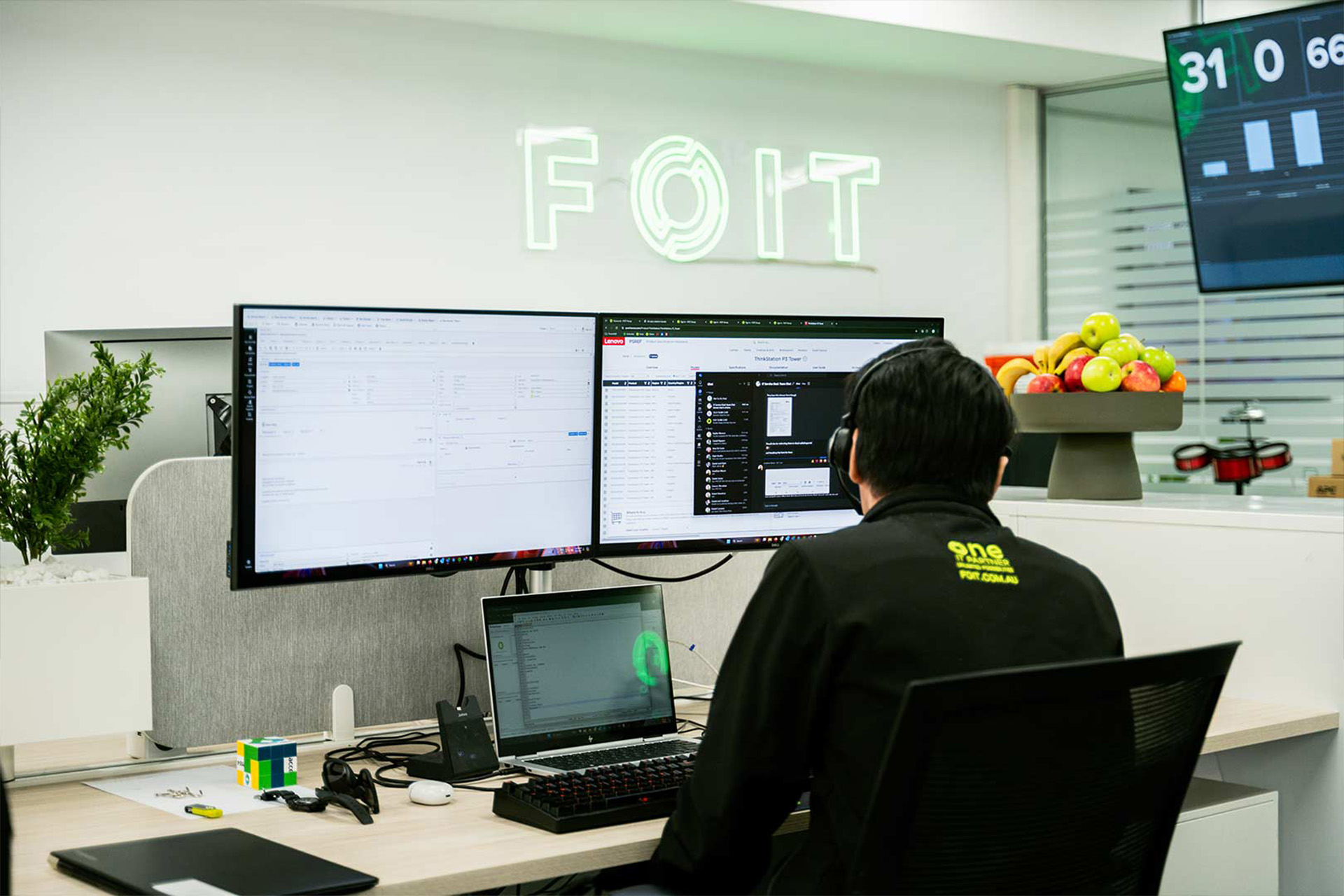What happens every 6 minutes in Australia? Another organisation falls victim to cybercrime.
The Australian Signals Directorate reports 87,400 cybercrime incidents in the past year. Australian businesses made 36,700+ calls to the Cyber Security Hotline last year seeking help against digital threats. This relentless digital assault creates urgent demand for cyber security professionals.
This guide maps your path to a cyber security career step by step. You’ll discover how to enter the field without prior experience, which certifications matter most, what skills command top salaries, and where to find job opportunities.
Ready to join the front lines of digital defense? Let’s begin.
How to Start a Cyber Security Career in Australia (Step-by-Step Guide)

Step 1: Learn Basic IT & Networking Fundamentals
Get comfortable with networking concepts like firewalls, VPNs, and how data moves across the internet. Learn to navigate Linux terminals and Windows systems; these skills pop up daily in cybersecurity roles.
Try these resources:
- Free labs: Use TryHackMe for guided exercises
- Cloud security: Practice with AWS/Azure free tiers
- Python basics: Automate simple tasks (like log analysis) with freeCodeCamp tutorials
No degree? No problem. Many Australian cybersecurity professionals start with self-taught IT skills and certifications.
Step 2: Get Entry-Level Cyber Security Certifications
The CompTIA Security+ is Australia’s go-to entry-level cert—it covers everything from encryption to incident response. Want to test systems for weaknesses? Add the Certified Ethical Hacker (CEH) to your toolkit.
Why certs work here:
Many companies and government agencies often require these qualifications for entry-level jobs. They prove you understand real-world threats and can handle basic security tasks.
Pro tip: Pair certifications with hands-on labs (e.g., log analysis projects).
Step 3: Apply for Internships and Entry-Level Jobs

Now that you’ve built a foundation of knowledge and skills, it’s time to break into the industry through hands-on experience. With over 2,300 unfilled cybersecurity roles across Australia as of late 2024, your timing couldn’t be better.
Top starter roles:
- SOC Analyst
- IT Support Technician (security focus)
- Cybersecurity Intern
- Cybersecurity Analyst (entry-level positions)
Step 4: Gain Hands-On Experience
Australian employers prioritise practical skills over theory. Your ability to demonstrate real-world cybersecurity competence will set you apart from other candidates.
Prove your skills in real scenarios:
- CTF competitions: AussieCTF (beginners), SANS CyberStart
- Bug bounties: Bugcrowd (low-risk programs)
- Community hackathons: SecTalks meetups in major Australian cities run regular security challenges
- Home labs: Create your own vulnerable environments using Australian-developed platforms like PentesterLab
- Open-source contributions: Join cybersecurity projects with Australian maintainers on GitHub
- CSIRO/Data61 initiatives: Participate in government-backed security research program
Why this matters:
Employers value experience over theory. Participating in Australian security events builds both technical skills and local industry connections. Listing CTF rankings or bug bounty finds on your resume demonstrates practical ability with real security challenges.
Step 5: Network and Build Your Professional Presence
The Australian cybersecurity community is tight-knit. Your connections can open doors faster than applications alone in this growing industry.
Your network accelerates your career:
- Join AISA (Australian Information Security Association) for member-exclusive webinars and job boards (note: paid membership with varying costs)
- Attend premier events like the Australian Cyber Conference (CYBERCON) or AusCERT Conference on the Gold Coast (May 20-23, 2025)
- Connect with Australian cybersecurity companies on LinkedIn to stay informed about their industry developments.
- Participate in local security meetups in major cities to build face-to-face relationships
Create a compelling digital presence:
- LinkedIn profile: Use industry-specific keywords, showcase certifications, and engage with Australian security leaders
- Security portfolio: Develop a GitHub repository or personal website documenting your projects, CTF write-ups, and security research
- Technical blog: Share vulnerability analyses or tool reviews to demonstrate your expertise and communication skills
- HackTheBox/TryHackMe profiles: Include your public profiles showing completed challenges relevant to Australian industry needs
Pro tip: Cold-message professionals for advice with specific, thoughtful questions. Approach respectfully and many will respond with valuable insights.
Best Cyber Security Certifications in Australia
Entry-Level Cyber Security Certifications
CompTIA Security+
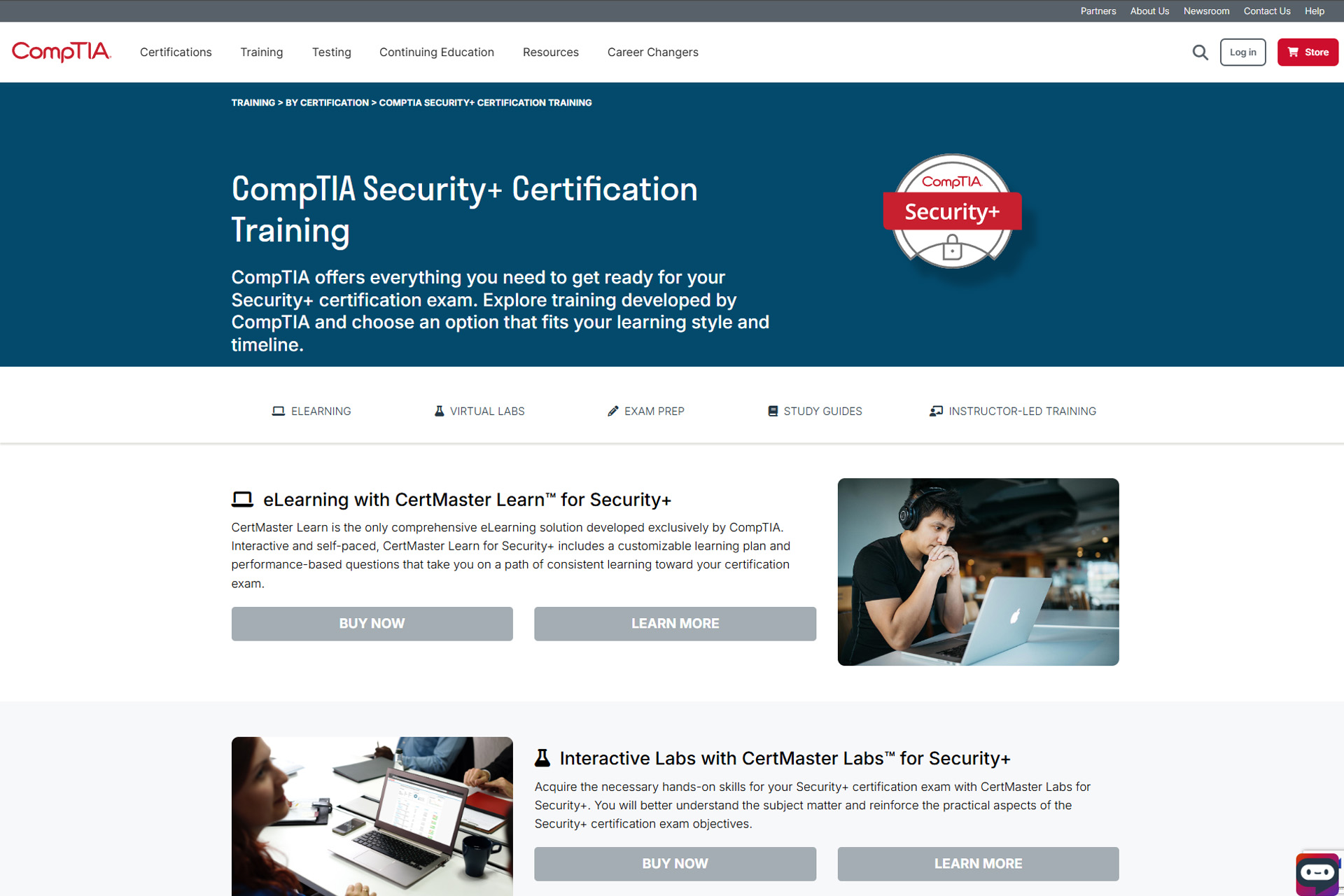
This foundational certification is the #1 requirement for breaking into Australian cybersecurity roles, covering essential skills like network defence and risk mitigation. Perfect for aspiring SOC analysts or IT security specialists.
Cost options:
- Exam Voucher only: $404.00 USD (with free retake)
- Basic Bundle: $581.00 USD (includes exam voucher, retake, and self-paced study guide)
- Exam Prep Bundle: $741.00 USD (includes exam voucher, retake, study guide, and CertMaster Practice)
- eLearning Bundle: $1,005.00 USD (includes exam voucher, retake, and CertMaster Learn with labs)
- Complete Bundle: $1,111.00 USD (includes all resources: voucher, retake, labs, and practice)
Why Get It: Qualifies you for 60% of entry-level job postings.
Skills Covered: Encryption, incident response, threat detection
CompTIA Cybersecurity Analyst (CySA+)

Level up from Security+ with a focus on behavioural analytics and threat hunting, ideal for mid-level roles in security operations centres.
Cost Option
- Exam Voucher only: $404.00 USD
- Basic Bundle: $581.00 USD (includes exam voucher, retake, and self-paced study guide)
- Exam Prep Bundle: $741.00 USD (includes exam voucher, retake, study guide, and CertMaster Practice)
- eLearning Bundle: $1,005.00 USD (includes exam voucher, retake, CertMaster Learn and labs)
- Complete Bundle: $1,111.00 USD (includes all resources: voucher, retake, CertMaster Learn, labs, and practice)
Why Get It: Employers like CyberCX prioritise this for threat detection roles
Skills Covered: Vulnerability management, SIEM tools, log analysis
GIAC Security Essentials Certification (GSEC)

Prove your hands-on technical skills with this globally respected certification, widely recognised in Australia for roles like security administrator.
Cost Option:
- Practitioner Certification Attempt: $999 USD
- Applied Knowledge Certification Attempt: $1,299 USD ($499 with active related GIAC Certification)
- Certification Attempt Retakes: $899 USD (Practitioner) / $1,199 USD (Applied Knowledge)
- Practice Test: $399 USD
Why Get It: Validates real-world skills in firewalls and malware analysis
Skills Covered: Security configuration, access controls, cryptography
Advanced Cyber Security Certifications
CISSP (Certified Information Systems Security Professional)
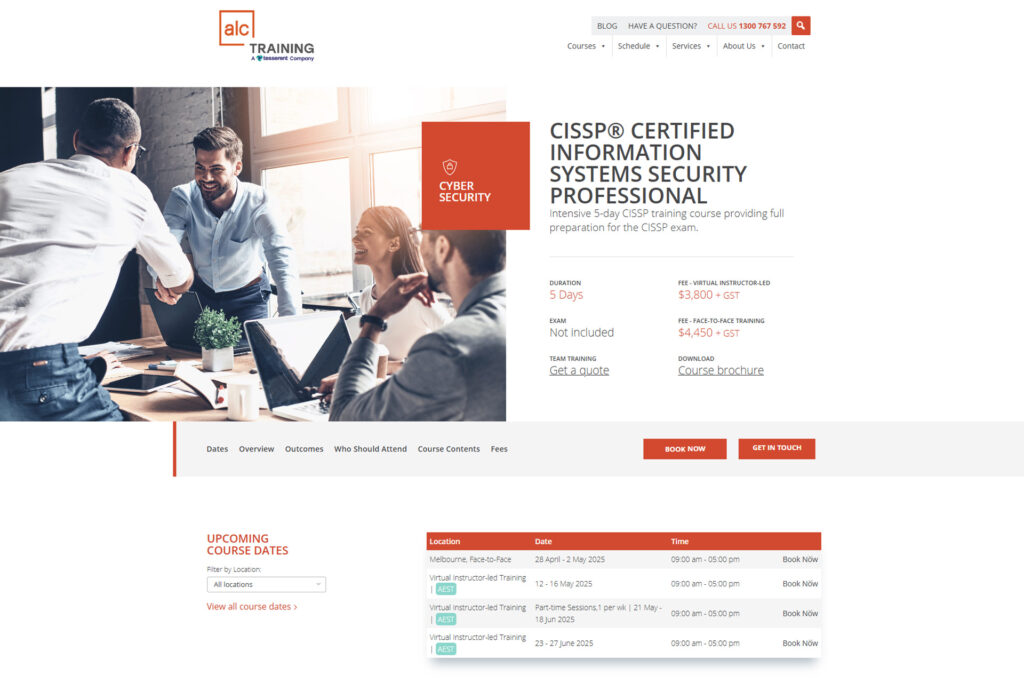
The gold standard for leadership roles, CISSP opens doors to six-figure salaries in security architecture or chief information security officer (CISO) positions.
- Cost:
- Exam fee: $1,200 AUD
Annual maintenance fee: $150 USD (approximately $240 AUD)- Training options (not required, but recommended):
- Virtual instructor-led training: $3,800 + GST
- Face-to-face training: $4,450 + GST
- Exam fee: $1,200 AUD
- Why Get It: Required for 75% of senior cybersecurity job listings
Skills Covered: Security policy design, cloud governance, risk assessment
Prerequisites:
While anyone can take the exam, the CISSP certification requires candidates to have a minimum of 5 years of direct, full-time security professional work experience in 2 or more of the 8 CISSP domains. One year may be waived with a four-year degree or approved credential. Candidates without sufficient experience can earn Associate of ISC2 status until they meet the requirements.
Unsure if you have adequate experience?
If you’re uncertain whether you meet the experience criteria, refer to the ISC2 website pages on Professional Experience Requirement and becoming an Associate of ISC2.
CEH (Certified Ethical Hacker)

Master offensive security tactics to ethically hack systems, a must-have for penetration testers and red team specialists in Australia’s growing cybersecurity sector.
Cost options:
- Exam fee with online proctoring: $550 USD
- VUE testing center exam: $650 USD
- Eligibility application fee (if not taking official training): $100 USD
- Official training costs vary but typically range from $2,500-$4,000 AUD
Why Get It:
- 50% of offensive security roles in Sydney list this as a requirement
- Recognised by the Australian government and major financial institutions
- Provides legal authorisation to conduct security assessments
Skills Covered: Metasploit, network scanning, social engineering, web application hacking, wireless network attacks, cloud security testing, mobile/IoT vulnerability assessment
Prerequisites:
Candidates need verifiable proof of 2 years of work experience in information security domains, or must complete official EC-Council training. Experience must cover areas like reconnaissance techniques, system hacking phases, network/perimeter hacking, or web application security.
Pathway options:
- Attend official training (waives experience requirement)
- Apply for exam eligibility with proof of experience (3-step process including application fee)
OSCP (Offensive Security Certified Professional)
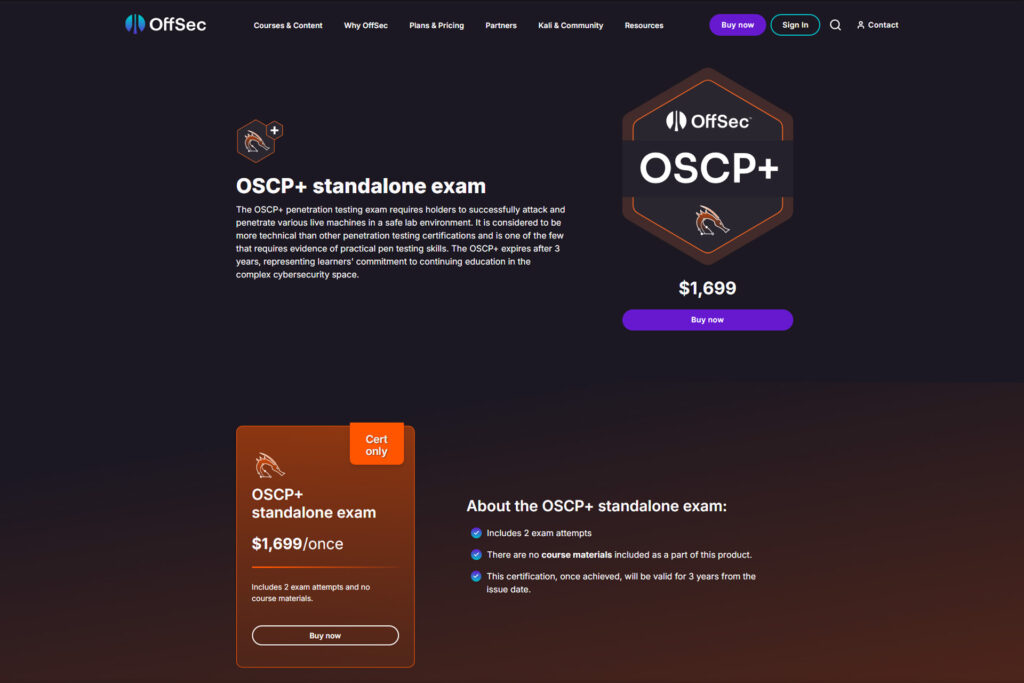
This gruelling certification proves you can exploit real-world systems, making it a favourite for high-paying penetration testing roles.
- Cost options:
- 90-day PEN-200 course + 1 exam attempt: $2,915 AUD (includes GST)
- 12-month PEN-200 subscription: $4,235 AUD (includes GST and 2 exam attempts)
- Standalone OSCP+ exam: $1,699 USD (~$2,548 AUD) + GST
- Why Get It:
- Widely recognised by Australian cybersecurity employers for red team positions
- Listed in the Australian Cyber Security Centre’s workforce framework for penetration testers
- Demonstrates practical skills rather than just theoretical knowledge
- Skills Covered: Advanced exploitation, privilege escalation, Active Directory attacks, comprehensive security reporting
Important 2024-2025 updates:
- New OSCP+ certification introduced (November 2024) with 3-year expiration, requiring renewal via exam retakes or CPE credits
- Legacy OSCP certifications (obtained before Nov 1, 2024) remain valid for life
- Existing OSCP holders can upgrade to OSCP+ for $199 USD (~$300 AUD) until March 2025
Unlike theoretical certifications, OSCP’s hands-on approach aligns perfectly with the practical security testing needs of Australian organisations facing sophisticated threat actors.
Certified Cloud Security Professional (CCSP)

Secure your future in Australia’s booming cloud security market, where demand continues to grow rapidly as businesses migrate to cloud platforms.
- Cost: $599 USD (approximately $900 AUD) for the exam fee, with additional costs for training materials and courses
- Why Get It:
- Demonstrates cloud security expertise across multiple platforms, including AWS and Azure
- Highly valued for cloud security roles in Melbourne and Sydney
- Recognised globally by major enterprises with cloud infrastructure
Skills Covered: Cloud architecture, data security, platform and infrastructure security, application security, security operations, legal and compliance frameworks
Australian-Specific Cyber Security Certifications
IRAP (Information Security Registered Assessors Program)
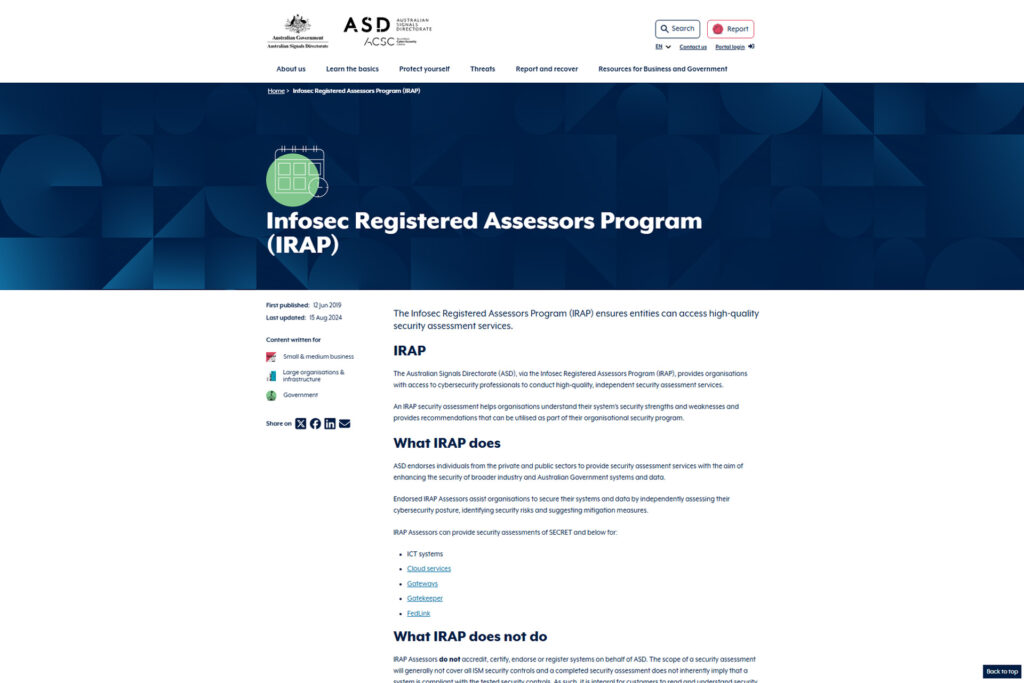
Developed by the Australian Signals Directorate (ASD), this certification allows professionals to assess systems against Australian government security requirements.
- Cost Options:
- IRAP Readiness Training: $3,750 + GST (in-person) or $3,600 + GST (virtual)
- Program application and assessment fees additional
- Total investment typically $5,000-$8,000 AUD including required training
- Why Get It:
- Essential qualification for consultants working with government agencies
- Highly sought after by organisations serving critical infrastructure sectors
- Creates significant career opportunities with federal and state departments
- Skills Covered: ASD Essential Eight compliance, Information Security Manual (ISM) controls, Australian government security requirements, risk assessment methodologies aligned with national frameworks
Program details: The 34-hour (4.5 day) training program provides comprehensive understanding of IRAP requirements and processes, focusing on minimising organisational disruption during assessments.
Australian Institute of Management (AIM) Cyber Security Courses

Develop leadership skills for cybersecurity management roles with courses focused on Australian industry standards and governance.
- Cost: $2,500-$4,000 AUD (varies by course)
- Why Get It: Enhances credentials for leadership positions in Australian organisations
- Skills Covered: Risk governance, stakeholder management, security strategy aligned with Australian compliance frameworks
Cyber Security Career Paths: Which One is Right for You?
| Job Role | Main Responsibilities | Salary Range (AUD) |
|---|---|---|
| Penetration Tester | Ethical hacking & security testing | $90K – $110K |
| Incident Responder | Investigating cyber attacks & breaches | $75K – $90K |
| Security Consultant | Advising companies on security strategies | $110K – $150K |
| Cyber Security Analyst | Monitoring and defending networks | $100K – $120K |
| Cloud Security Engineer | Securing AWS, Azure, or Google Cloud | $128K – $162K |
| IoT Security Specialist | Protecting connected devices | $66K – $100K |
| SOC Analyst | Monitoring & responding to security incidents | $63K – $90K |
| Chief Information Security Officer (CISO) | Leading cyber security strategy | $164K – $304K+ |
Penetration Tester
These digital safe-crackers legally hack systems to expose weaknesses before criminals do. They test websites, networks, and applications using tools like Metasploit, documenting every vulnerability for remediation.
Incident Responder
When breaches happen, these cyber firefighters jump into action, containing attacks and recovering systems. They analyse malware, restore data, and develop procedures to prevent similar incidents.
Security Consultant
Strategic advisors who help businesses identify and manage security risks. They assess current defences, recommend improvements, and ensure compliance with regulations like the Privacy Act.
Cyber Security Analyst
These front-line defenders monitor networks, investigate suspicious activities, and implement protective measures. They analyse threats using SIEM tools and maintain security controls like firewalls.
Cloud Security Engineer
Specialists who secure cloud environments through encryption, access controls, and continuous monitoring. They protect data in AWS, Azure, or Google Cloud from unauthorised access and exfiltration.
IoT Security Specialist
Experts who protect the growing ecosystem of connected devices from hackers. They develop secure communication protocols, test firmware vulnerabilities, and design safeguards for smart technologies.
SOC Analyst
Real-time threat hunters working in Security Operations Centers to detect and respond to attacks. They monitor alerts, analyse event logs, and coordinate responses to security incidents.
Chief Information Security Officer (CISO)
Executive leaders who shape organisational security strategy and manage cyber risk. They oversee security teams, secure budget for defences, and report to boards on the evolving threat landscape.
Cyber Security Salary Range Australia
Real-World Salary Ranges (AUD) by Experience Level
Entry-Level
Launch your cyber security career with foundational roles focused on monitoring, incident triage, and basic threat analysis. Entry-level professionals often start in Security Operations Centers (SOCs) or IT support teams to build practical skills.
Salary Range: AU$55,000 – AU$110,000
Mid-Level
Mid-career professionals tackle advanced threats, lead security projects, and specialise in areas like penetration testing or incident response. Certifications like CISSP or OSCP are critical for salary growth at this stage.
Salary Range: AU$100,000 – AU$160,000
Senior-Level
Senior roles demand strategic leadership, risk management expertise, and deep technical knowledge. CISOs and Security Architects shape organisational security strategies, often requiring certifications like CCSP.
Salary Range: $150,000 – $250,000+
Where to Find Cybersecurity Jobs in Australia
General Job Boards:
- SEEK Cybersecurity Jobs: seek.com.au/cyber-security-jobs
- LinkedIn Jobs: linkedin.com/jobs
- Indeed Australia: au.indeed.com
Government Positions:
- APS Jobs Portal: apsjobs.gov.au
- ASD Careers: asd.gov.au/careers
- ACSC Careers: cyber.gov.au/careers
- Defence Jobs: defencejobs.gov.au
Financial Sector:
- CBA Careers: commbank.com.au/about-us/careers
- NAB Careers: nab.com.au/about-us/careers
- Westpac Careers: westpac.com.au/about-westpac/careers
Tech Companies:
- Atlassian Jobs: atlassian.com/company/careers
- Telstra Careers: careers.telstra.com
- Canva Jobs: canva.com/careers
Security-Specific Platforms:
- CyberCX Careers: cybercx.com.au/careers
- Bugcrowd Jobs: bugcrowd.com/bug-bounty-list
- HackerOne Opportunities: hackerone.com/opportunities
- FOIT Group: https://foit.com.au/careers/
Remote and Flexible Work in Cyber Security
The Australian cybersecurity sector has widely adopted flexible work arrangements post-pandemic. Most employers now offer hybrid models, with some roles entirely remote. Technical specialists like security architects and penetration testers typically enjoy the greatest flexibility.
Professionals can now access opportunities nationwide without relocation—Sydney talent can work for Melbourne firms, while regional candidates can compete for metropolitan positions. Global companies like CrowdStrike and Palo Alto Networks also hire Australian cybersecurity professionals for remote roles.
Work-life balance varies by specialisation: SOC analysts often work shifts for 24/7 coverage, while consultants and architects generally enjoy more flexible schedules tied to project timelines.
